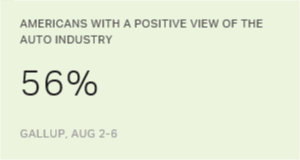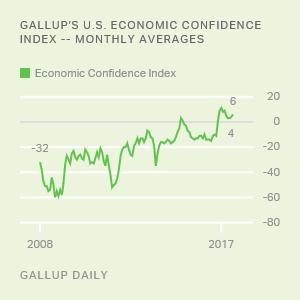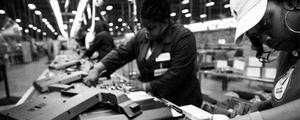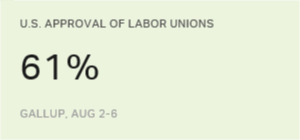Story Highlights
- 56% of Americans view the auto industry positively
- Republicans' rating of auto industry has rebounded
WASHINGTON, D.C. -- Fifty-six percent of Americans view the automobile industry positively, a new high in Gallup's 17-year trend. This is more than twice as high as it was in 2009, when Americans' positive rating of the auto industry bottomed out at 24% in the wake of the U.S. government bailout of automakers during the Great Recession.
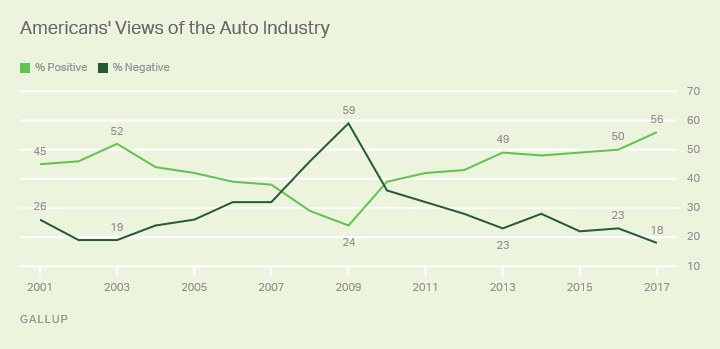
For the past 17 years, Gallup has asked U.S. adults annually to rate a wide array of business and industry sectors, including the automobile industry. The latest reading is based on Gallup's Aug. 2-6 update.
This year, views of the auto industry rank in the top half of the 25 sectors tracked. The industry's worst ranking coincided with the government bailout of automakers in 2009, when the car industry was rated more negatively than all business sectors tested except for the oil and gas industry.
The 2009 bailout, which was generally unpopular with the public, came at a time when the auto industry's positive rating had already started to fall from its previous high of 52% in 2003. As the economy began to recover, so too did the public's view of the car industry.
A decline in U.S. car sales this summer apparently is not related to Americans' improved view of the industry compared with 2016, suggesting that other factors may influence the public. While the general state of the economy may be one such factor, more industry-specific causes might be at play -- specifically, major advances in automobile technology, as well as new choices for how people can integrate cars into their lives. From increasingly autonomous, connected and electric options to ride-hailing business models, the industry may increasingly be seen as a leader in U.S. innovation. This evolution in the auto industry has resulted in a larger role for computer technology companies.
Politics and the Auto Industry
While politics may not initially spring to mind when thinking about cars, party affiliation is one of the largest demographic differences in perceptions of the auto industry. Partisans' positive views of the auto industry have generally tracked with the party of the president.
When George W. Bush was in office, Republicans were more positive than Democrats about the car industry. The auto bailout, deeply unpopular among Republicans, occurred toward the end of Bush's presidency and the beginning of Barack Obama's. Positive perceptions of the industry sunk to their lowest point in 2009, most likely reflecting both the bailout and the shift to a Democratic president. During the Obama years, as the economy recovered, Democratic positive views of the car industry rose.
| Republicans | Democrats | Difference | |||||||||||||||||||||||||||||||||||||||||||||||||||||||||||||||||||||||||||||||||||||||||||||||||
|---|---|---|---|---|---|---|---|---|---|---|---|---|---|---|---|---|---|---|---|---|---|---|---|---|---|---|---|---|---|---|---|---|---|---|---|---|---|---|---|---|---|---|---|---|---|---|---|---|---|---|---|---|---|---|---|---|---|---|---|---|---|---|---|---|---|---|---|---|---|---|---|---|---|---|---|---|---|---|---|---|---|---|---|---|---|---|---|---|---|---|---|---|---|---|---|---|---|---|---|
| % | % | pct. pts. | |||||||||||||||||||||||||||||||||||||||||||||||||||||||||||||||||||||||||||||||||||||||||||||||||
| 2001-2008 (Bush) | 46 | 38 | +8 | ||||||||||||||||||||||||||||||||||||||||||||||||||||||||||||||||||||||||||||||||||||||||||||||||
| 2009-2016 (Obama) | 40 | 48 | -8 | ||||||||||||||||||||||||||||||||||||||||||||||||||||||||||||||||||||||||||||||||||||||||||||||||
| 2017 (Trump) | 60 | 52 | +8 | ||||||||||||||||||||||||||||||||||||||||||||||||||||||||||||||||||||||||||||||||||||||||||||||||
| Gallup | |||||||||||||||||||||||||||||||||||||||||||||||||||||||||||||||||||||||||||||||||||||||||||||||||||
With Donald Trump in the White House, a majority of Republicans now view the auto industry positively, but fewer Democrats do so. Trump campaigned on bringing auto manufacturing back to the U.S. -- and earlier this year, at the urging of automakers, eased the Obama administration's regulations aimed at cutting down on auto emissions.

Gallup Analytics
Subscribe to our online platform and access nearly a century of primary data.
Implications
The public's record-high rating of the auto industry comes as the sector experiences major changes with the rapid introduction of new technologies and business models. These changes are fundamentally altering both the relationship that Americans traditionally have had with their cars and their expectations for the future. Rather than living in the past, automakers and tech giants have their eyes on the future and are reconsidering how Americans fit cars into their daily lives.
This future orientation of U.S. automakers, and their innovations, may be factors in the public's increasingly positive rating of the industry. Americans' high rating of the computer industry may help to further buoy views of the automobile industry as the two become more intertwined.
Survey Methods
These results are based on telephone interviews conducted Aug. 2-6, 2017, with a random sample of 1,017 adults, aged 18 and older, living in all 50 U.S. states and the District of Columbia.
The auto industry was rated by a randomly chosen half sample of respondents, totaling approximately 500. The results have a margin of sampling error of ±6 percentage points at the 95% confidence level. All reported margins of sampling error include computed design effects for weighting.
Each sample of national adults includes a minimum quota of 70% cellphone respondents and 30% landline respondents, with additional minimum quotas by time zone within region. Landline and cellular telephone numbers are selected using random-digit-dial methods.
Learn more about how the Gallup Poll Social Series works.
